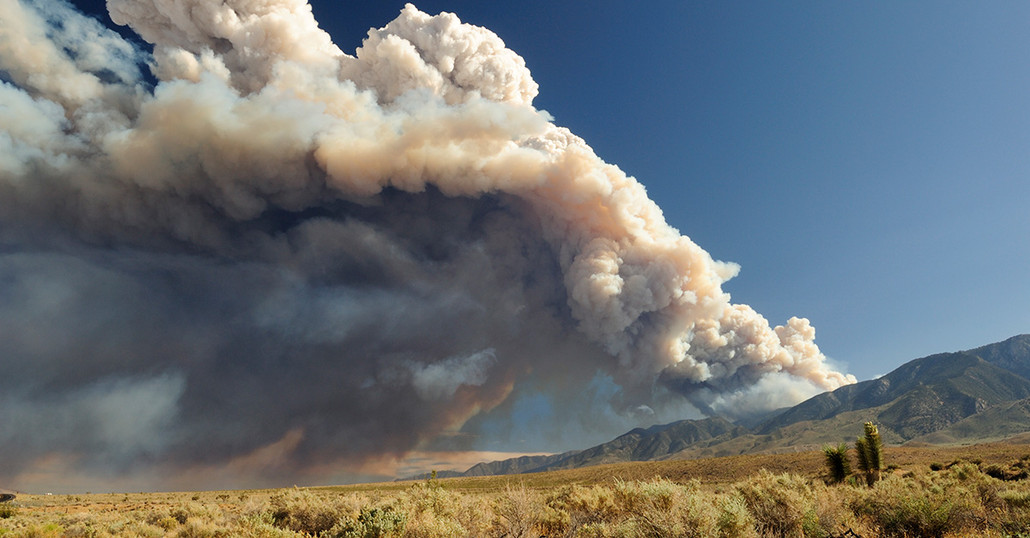
Wildfire Smoke Protection for Humans, Pets & Livestock
Posted by Grange Co-op on 24th Jul 2019
The damage and expense of wildfires within the nation continues to soar, not only destroying acres of land but can posing other threats as well. The smoke from thousands of fires annually can cause serious health damage to not only humans but their pets and livestock as well. Which is why this GrangeKnows article provides tips and information regarding wildfire smoke protection. We’ve researched some of the primary sources for wildfire smoke protection and compiled them below.
Wildfire Smoke Protection
This article from the California Department of Public Health provides facts on choosing the correct mask to protect your lungs. Wildfire smoke contains a mixture of gases and fine particles from burning trees and other plant material that can be dangerous when inhaled. Smoke can not only irritate one’s respiratory system but can also cause watery or dry eyes, coughing, headaches, and shortness of breath. The particulate matter (often called “PM”) in wildfire smoke, depends on the type of plants burning, atmospheric conditions, and the size of the particles. Ultimately, the higher the PM, the greater at risk those subjected to the smoke will be, indicating the importance of choosing the correct type of mask to properly protect against wildfire smoke.
Outlining the importance of wildfire smoke protection, this
article by airnow.gov lists resources on information about home air cleaners, certified air cleaning devices, what to do before, during, and after a wildfire, plus more information on the correct way to use particulate respirator masks. In need of new or additional N-95 or P-100 particulate respirator masks? Here is a complete list of particulate respirator masks you can find at your local Grange Co-op.

For many of us, we’re not only responsible for the safety and health of ourselves but our livestock and pets as well. Because your animals cannot actively defend and utilize their own wildfire smoke protection for their safety, it’s important to keep close watch on them and recognize the signs of smoke or dust irritation. This article lists symptoms and tips helpful to animal owners during wildfire season.
In the unfortunate event of evacuation, wildfire smoke protection tips must transform into a livestock evacuation plan. Evacuation plans are best if decided upon and prepared in advance. Planning can ultimately mean the difference between life and death. The article above lists how to plan for a disaster when you own large animals and livestock. Part of any evacuation plan includes evacuation kits. What to include in equine, livestock, and poultry evacuation kits can be found by clicking the read more button below, provided by the American Veterinary Association.
Backyard poultry evacuation kit
• Leg bands with an emergency telephone number and photos of birds can help you identify them if they escape or get lost. • Feed and water for 7 -10 days. Vitamin and electrolyte packs (stress packs) may help ease stress. • Sufficient feeders and waterers for the number of birds. • Detergent, disinfectant, gloves and other cleaning supplies for cleaning cages. • Feeders and drinkers. • Extra absorbent bedding material (newspapers can work temporarily) to line cages or temporary coops. • If evacuating chicks, consider their special needs (heat, food, equipment).
Equine and livestock evacuation kit
• 7-10 day supply of feed, supplements, and water
• Bandanas (to use as blindfolds)
• Batteries (flashlight, radio)
• Blankets
• Copies of veterinary records and proof of ownership
• Cotton halter
• Duct tape
 • Emergency contact list
• First aid kit (see item suggestions in the
Saving the Whole Family brochure)
• Flashlight
• Fly spray
• Grooming brushes
• Heavy gloves (leather)
• Hoof knife
• Hoof nippers
• Hoof pick
• Hoof rasp
• Instructions
o Diet: record the diet for your animals.
o Medications: list each animal separately, and for each medication include the drug name, dose and frequency. Provide veterinary and pharmacy contact information for refills.
• Knife (sharp, all-purpose)
• Leg wraps and leg quilts
• Maps of local area and alternate evacuation routes in addition to GPS (in case of road closures)
• Non-nylon halters and leads (leather/cotton)
• Nose leads
• Paper towels
• Plastic trash cans with lids (can be used to store water)
• Portable livestock panels
• Radio (solar, hand cranked and/or battery operated)
• Rope or lariat
• Shovel
• Tarpaulins
• Trash bags
• Twitch
• Water buckets
• Whip/prods
• Wire cutters
• Emergency contact list
• First aid kit (see item suggestions in the
Saving the Whole Family brochure)
• Flashlight
• Fly spray
• Grooming brushes
• Heavy gloves (leather)
• Hoof knife
• Hoof nippers
• Hoof pick
• Hoof rasp
• Instructions
o Diet: record the diet for your animals.
o Medications: list each animal separately, and for each medication include the drug name, dose and frequency. Provide veterinary and pharmacy contact information for refills.
• Knife (sharp, all-purpose)
• Leg wraps and leg quilts
• Maps of local area and alternate evacuation routes in addition to GPS (in case of road closures)
• Non-nylon halters and leads (leather/cotton)
• Nose leads
• Paper towels
• Plastic trash cans with lids (can be used to store water)
• Portable livestock panels
• Radio (solar, hand cranked and/or battery operated)
• Rope or lariat
• Shovel
• Tarpaulins
• Trash bags
• Twitch
• Water buckets
• Whip/prods
• Wire cutters
There isn't much you can do to stop raging forest fires, however you can prepare yourself for evacuation situations and smoke protection by taking the proper precautions. For products to assist in your own wildfire smoke protection, visit any of our Grange Co-op
locations and talk with one of our customer service representatives today.
